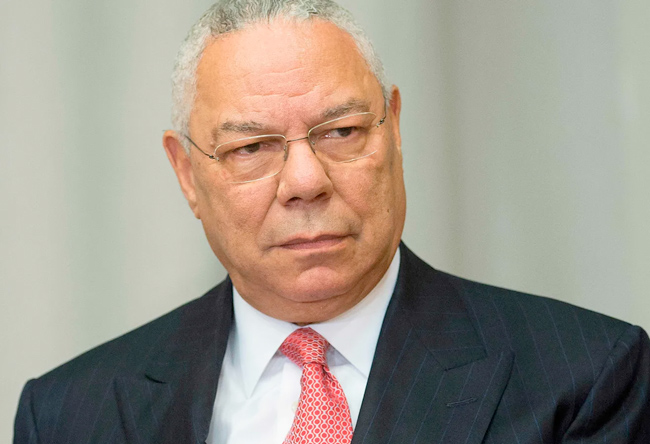Colin Powell, first Black secretary of state, dies from COVID-19 complications
Colin Powell, the trailblazing military commander and first Black secretary of state, died Monday of COVID-19 related complications.
Powell, 84, was born in New York City and joined the Army after graduating from the City University of New York. He died Monday at Walter Reed National Medical Center. His family said he was fully vaccinated against COVID-19.
“We have lost a remarkable and loving husband, father, grandfather and a great American,” Powell’s family said in its statement.
Secretary of State in Iraq War
He rose through the ranks of the armed forces in a decades-long career that culminated in his service first as national security adviser to then-President Ronald Reagan and as the 12th chairman of the joint chiefs of staff, the highest-ranking military appointment in the Defense Department.
Powell went on to serve as secretary of state under former President George W. Bush from 2001 to 2005, overseeing U.S. diplomacy in the aftermath of the Sep. 11, 2001, terror attacks and the invasions of Afghanistan and Iraq.
His reputation took a hit, though, in 2003 when Powell told the United Nations Security Council that Saddam Hussein had weapons of mass destruction to justify war in Iraq, citing faulty information.
Career of firsts
Powell was a trailblazer in his public service career, serving as the first Black person to become national security advisor, chairman of the chiefs of staff and secretary of state, under President George W. Bush.
Bush lamented Powell’s passing and praised his career.
“He was a great public servant, starting with his time as a soldier during Vietnam,” Bush said in a prepared statement on Monday. “He was such a favorite of presidents that he earned the Presidential Medal of Freedom – twice. He was highly respected at home and abroad. And most important, Colin was a family man and a friend.”
In 2008, Powell, who previously served in Republican administrations, endorsed Barack Obama for president ahead of his historic victory. Powell later became disenchanted with the Republican Party under former President Donald Trump.
Colin Powell Dies Of Complications From COVID-19
Colin Powell, first Black US secretary of state, dies of Covid-19 complications amid cancer battle
Colin Powell, the first Black US secretary of state whose leadership in several Republican administrations helped shape American foreign policy in the last years of the 20th century and the early years of the 21st, has died from complications from Covid-19, his family said on Facebook. He was 84.
“General Colin L. Powell, former U.S. Secretary of State and Chairman of the Joint Chiefs of Staff, passed away this morning due to complications from Covid 19,” the Powell family wrote on Facebook, noting he was fully vaccinated.
A source familiar with the matter said Powell had multiple myeloma, a cancer of plasma cells that suppresses the body’s immune response. Even if fully vaccinated against Covid-19, those who are immunocompromised are at greater risk from the virus.
“We have lost a remarkable and loving husband, father, grandfather and a great American,” the family said.
Leaders mourn a ‘trailblazer and role model’
Powell’s death was met with an outpouring of grief from former and current leaders, including former Vice President Dick Cheney, who served alongside Powell under Bush.
“I’m deeply saddened to learn that America has lost a leader and statesman. General Powell had a remarkably distinguished career, and I was fortunate to work with him,” Cheney said in a statement, adding that Powell was a “trailblazer and role model.”
Defense Secretary Lloyd Austin said in remarks on Monday that in Powell he “lost a tremendous personal friend and mentor.”
“He always made time for me and I could always go to him with tough issues. He always had great counsel. We will certainly miss him,” said Austin, who himself made history earlier this year as the first Black Defense secretary.
Retired Gen. Martin Dempsey, who served for a time as Obama’s chairman of the Joint Chiefs of Staff, also mourned the loss of Powell, writing in a tweet on Monday that he was “A superb soldier, statesman, and lifelong public servant.”
And former UK Prime Minister Tony Blair, who was in office while Powell served in the Bush administration, called Powell “a towering figure in American military and political leadership,” adding in a statement that he “inspired loyalty and respect.”
Professional soldier
Colin Luther Powell was born April 5, 1937, in Harlem, New York, to Jamaican immigrants. After growing up in the South Bronx, Powell attended school at the City College of New York, where he participated in ROTC, leading the precision drill team and attaining the top rank offered by the corps, cadet colonel.
“I liked the structure and the discipline of the military,” Powell said, according to a CNN profile of him in the early 2000s. “I felt somewhat distinctive wearing a uniform. I hadn’t been distinctive in much else.”
Top diplomat during turbulent time
With a prominent national profile, Powell was floated as a potential presidential candidate in the 1996 election. But in a highly anticipated decision, he declined to participate in the race, citing a lack of “passion” for electoral politics.
“Such a life requires a calling that I do not yet hear,” he told reporters in 1995. “And for me to pretend otherwise would not be honest to myself, it would not be honest to the American people.”
Powell was again encouraged to run in the 2000 presidential election, but rebuffed calls for him to mount a bid. He instead endorsed George W. Bush, delivering a speech at the Republican National Convention in which he argued that the then-governor of Texas would “help bridge our racial divides.”
He was Bush’s first Cabinet selection when he was announced as the 43rd President’s nomination for secretary of state, and with his expertise in foreign policy and widespread popularity, he was unanimously confirmed by the Senate.
Shifting politics
After leaving the Bush administration, Powell returned to private life. He joined the renowned venture capital firm Kleiner Perkins in 2005, where he worked as a strategic adviser until his death. For a time, he gave speeches at “Get Motivated!” business seminars, and he authored the 2012 memoir.
Though the large majority of Powell’s time as a public servant was spent in Republican administrations, the later years of his life saw him supporting Democratic presidential candidates and harshly criticizing top Republican leaders.
By 2008, the longtime Republican’s coveted presidential endorsement went to another party when he announced his support for Obama’s White House bid. At the time, he touted Obama’s “ability to inspire” and the “inclusive nature of his campaign,” while criticizing attacks on the Illinois senator by Republican presidential nominee John McCain’s campaign as “inappropriate.” He was later named an honorary co-chair of Obama’s inauguration and endorsed him again in 2012.
Powell went on to vote for Hillary Clinton in 2016 over Donald Trump, whom he had strongly condemned as a “national disgrace and an international pariah.”
also read :
- See Kourtney Kardashian’s Massive Diamond Engagement Ring From Travis Barker. + Kim Kardashian, Addison Rae and Alabama Barker react. Keeping Up with the Kardashians
- Channing Tatum Wades Into Controversy Surrounding Dave Chappelle ! but Channing Tatum Gets His Magic Mike On as He Dances for His Fans
- Garena Free Fire diamonds for free + 3 best apps to claim diamonds free of cost + Redeem Codes
- Mindy Kaling on The Sex Lives of College Girls , HBO Max Comedy + Trailer
- Cameron Norrie (British No1) reaches Indian Wells final by beating Grigor Dimitrov
Colin Powell, a former secretary of state, dies at 84
The Army helped Powell find his path
Powell, the son of Jamaican immigrants, grew up in a working class family in Harlem. In the Army, he found a culture where a Black man could find his own path — where race, background and income level didn’t define you, he told NPR in 2012.
“People have asked me, ‘What would you have done if you hadn’t gone into the Army?’ I’d say, ‘I’d probably be a bus driver, I don’t know,'” Powell said.
Vietnam forever informed his approach to foreign policy
He would remember the lessons of Vietnam as he rose through the ranks, eventually becoming chairman of the Joint Chiefs of Staff under then-President George H.W. Bush.
Powell came into the public consciousness during the first Gulf War when he advocated for overwhelming military force against Saddam Hussein’s Iraqi army, which had invaded Kuwait.
He was for years one of the most widely admired Americans. After retiring from the Army, he wrote a memoir and was later tapped by President George W. Bush to serve as secretary of state. Bush described Powell as a “tower of strength and common sense.”
In a statement after Powell’s death, Bush called him “a great public servant,” liked by presidents and “highly respected at home and abroad.”
“And most important, Colin was a family man and a friend,” he said.
But Powell’s defense of the 2003 invasion of Iraq and his presentation at the United Nations of evidence of weapons of mass destruction that turned out not to exist — drew widespread criticism and put a blemish on his reputation.
He grew disenchanted with the GOP under Donald Trump
Although moderate by today’s standards, Powell was a nearly lifelong Republican, having served three GOP presidents, having also served as Ronald Reagan’s national security adviser.
But in 2008, he endorsed then-Democratic presidential nominee Barack Obama over Sen. John McCain, citing his concerns over the direction of the Republican Party at the time.
In 2016, he said he would not vote for Donald Trump and later called out the 45th president. “We have a Constitution. We have to follow that Constitution. And the president’s drifted away from it,” Powell said in 2020 after Trump threatened to use military force against Black Lives Matter protesters.
Colin Powell
Colin Luther Powell was an American politician, diplomat and four-star general who served as the 65th United States Secretary of State from 2001 to 2005.
(/ˈkoʊlɪn/; April 5, 1937 – October 18, 2021)
He was the first African-American Secretary of State.
Prior to the election of Barack Obama as president in 2008, he and his successor, Condoleezza Rice, were the highest-ranking African Americans in the history of the federal executive branch (by virtue of the Secretary of State standing fourth in the presidential line of succession). He served as the 16th United States National Security Advisor from 1987 to 1989 and as the 12th Chairman of the Joint Chiefs of Staff from 1989 to 1993.


















